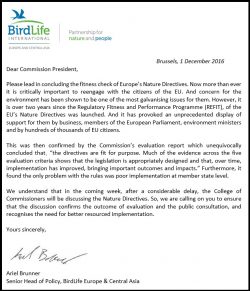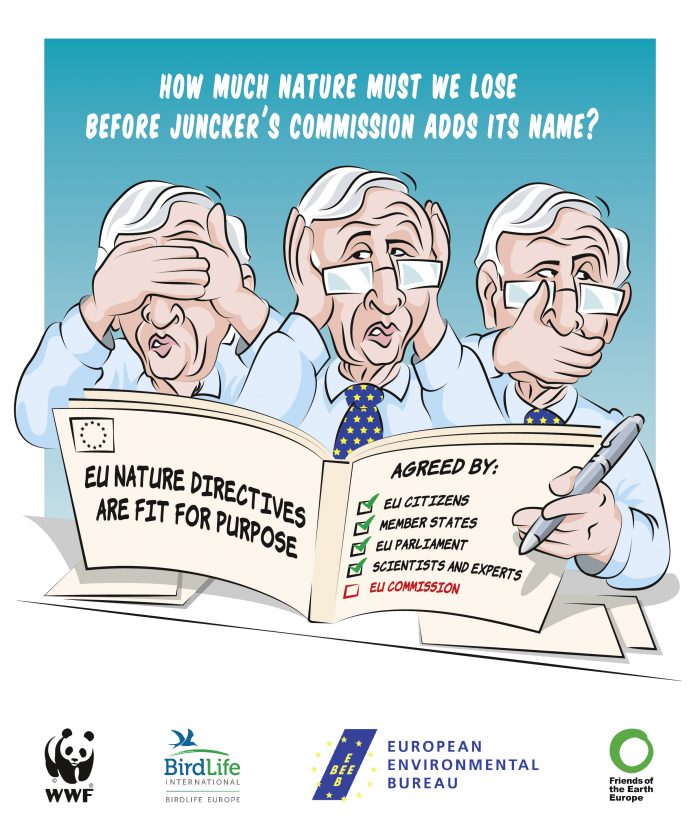Fitness Check of the Birds and Habitats Directives
What
- Today, Wednesday 7th December, the College of Commissioners will decide the fate of the EU’s flagship nature laws, the Birds and Habitats Directives. Their decision, to revise or uphold these laws, will be based on the findings of the Fitness Check [http://bit.ly/1REUZ73] of these Directives.
Context: what are the nature laws?
- The Birds and Habitats Directives contribute to achieving the EU’s commitment under the UN Convention on Biological Diversity to halt and reverse biodiversity loss by 2020, and will help to reach the UN Sustainable Development Goals. http://bit.ly/2gCdWjY
- The Birds and Habitats Directives are responsible for the creation of the largest and most coherent network of protected natural areas in the world (the ‘Natura 2000’ network), covering 18% of EU territory on land (over 1 million square kilometres) and around 6% of its seas.
- They represent the cornerstone of EU-wide efforts to halt and reverse the loss of biodiversity, and provide protection for threatened habitats and over 1,000 rare and vulnerable species e.g. the Imperial eagle, Lynx, and Dalmatian pelican.
- Over one billion people visit Natura 2000 sites, including the Danube Delta, the Picos de Europa, the Carpathian Mountains and the Waddenzee each year, supporting 4.5 to 8 million jobs. http://bit.ly/2gCjmeP

Letter sent by Ariel Brunner, Senior Head of Policy at BirdLife Europe to European Commission President Juncker to save the Nature Directives
Record-breaking campaign to save the nature laws
- The European Commission’s review of the Directives arose from President Jean-Claude Juncker’s instruction in 2014 to “carry out an in-depth evaluation of the Birds and Habitats Directives and assess the potential for merging them into a more modern piece of legislation”, as part of the ‘better regulation’ initiative.
- An unprecedented coalition of over 200 NGOs across every EU member state arose in response, calling for the Directives to be saved and better implemented – not ‘modernised’.
- Over 500,000 citizens took part in the European Commission’s consultation on the Directives in 2015 asking to maintain existing EU nature protection rules – the largest response to any Commission consultation to date. http://bit.ly/2gCiF5h
- In December 2015, the Environment Council recognised the importance of full implementation of these “essential” laws to “maintain legal certainty for all stakeholders”. http://bit.ly/2gCk2Rs
- In February 2016, the European Parliament voted overwhelmingly to oppose “a possible revision of the Nature Directives”. http://bit.ly/2gC97HF
- 312 small and medium-sized enterprises have called on the Commission to maintain stable, effective and predictable nature legislation. http://bit.ly/2gCe3fH
- In March 2016, a Commission external evaluation concluded that the Directives are ‘fit for purpose’ (released through an access to documents request). http://bit.ly/2gClHGG
What’s next?
- The outcome of the Commissioners’ decision will be presented to Environment Ministers at the Environment Council on 19th December, and the European Commission may produce an “action plan” to speed up actions to safeguard biodiversity in early 2017 (the Commission admits progress to this target is currently far off track (link).
- Preventing revision of the nature laws alone will not be enough to meet this target and meaningfully tackle nature loss, however. The Commission and Member States must better implement and enforce the Directives, provide sufficient investment, and ensure a better integration of nature conservation into other EU policies, notably agriculture (link).
The College Debate will be followed by a press conference, where the European Commission is expected to present the results of the debate.
For further information, please contact and follow : #NatureAlert


